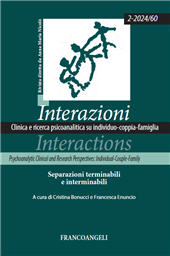La supervisione di gruppo nell'istituzione : il soggetto del campo e la scena primaria
127-143 p.
L'autore propone una lettura del campo analitico nelle supervisioni di gruppo. L'ipotesi è che il campo si strutturi intorno a pattern relazionali che tendono a ripetere relazioni d'oggetto primarie, fantasmi originari, scene traumatiche, parti scisse che vengono messe in scena nel gruppo-équipe. Tale visione resta centrata sul soggetto, anche se in oscillazione con una scena primaria di gruppo, la cui comprensione richiede una integrazione tra modelli monopersonali e concezioni di campo transpersonali. Il soggetto e la sua storia funzionano da potenti attratto-ri, che mettono in risonanza immagini di pensiero disperse, da cui il soggetto emerge infine come una immagine olografica, policentrica e condivisa. Elemento centrale è la scena prima-ria, il cui fantasma funziona da organizzatore del campo, mentre i concetti di transfert topico e di oscenalità mostrano i movimenti dei fantasmi primari, nel gioco di interfaccia tra il soggetto e il gruppo. [Testo dell'editore].
The author proposes a reading of the analytical field of group supervision. The hypothesis is that the field is structured around relational patterns that tend to repeat primary object rela-tionships, original ghosts, traumatic scenes, split off parts of the subject that are staged in the group-team. This vision of the field remains centered on the subject, even if in constant oscilla-tion with a primal group scene, the understanding of which requires a sort of integration be-tween single-person models and transpersonal conceptions of the field. The subject and its history function as powerful attractors, capable of putting distant and dispersed images of thought into resonance, organizing them in a common psychic field, from which the subject finally emerges as a holographic, polycentric and shared image.
The central element is the pri-mal scene, whose ghost functions as an organizer of the emotional field, while the concepts of topical transference and obscenity show the movements of the primary ghosts, in the interplay between the subject and the group. The internal, split group nature of the subject enters into resonance with the external one of the operators, whereby each member is captured in com-mon behaviors and fantasies, connected to those of the patient. Group work allows us to "dream together" of the split and unconscious aspects, which can be integrated, or in any case accepted in their difference and polarity as non-integrable opposites, at least in the here and now. [Publisher's Text].
Is part of
Interazioni : clinica e ricerca psicoanalitica su individuo-coppia-famiglia : 60, 2, 2024-
Articles from the same issue (available individually)
-
Information
ISSN: 2239-4389
DISCIPLINES
KEYWORDS
- supervisione di gruppo, campo analitico, scena primaria, transfert topico, oscenalità, pensiero onirico
- group supervision, analytic field, primal scene, topical transference, obscenality, dreaming thinking


